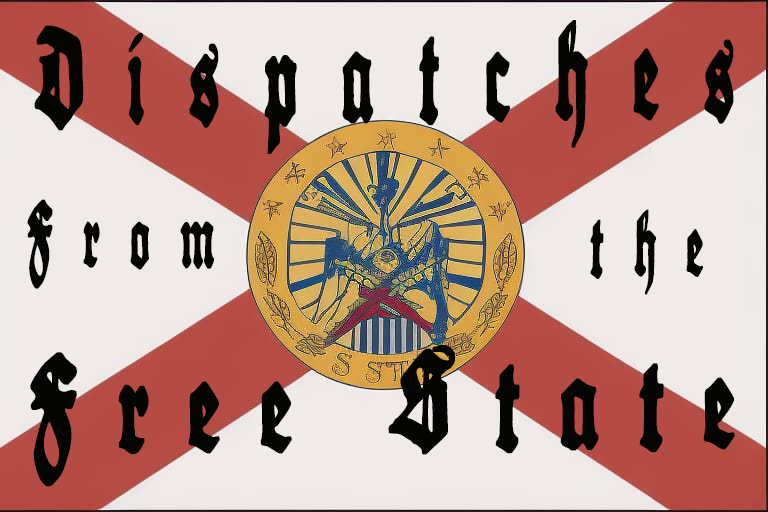Why we are complicit in the domestic spying scandal
The most noteworthy observation that I have about the great brouhaha over Glen Greenwald’s expose of US domestic spying in The Guardian is how absolutely shocked everybody seems. The press and the social media act as if this is some sudden revelation. We had no idea this was going on. How could  we possibly have known?
we possibly have known?
Frankly, if you didn’t know, then you haven’t been paying attention. You haven’t been paying attention to the news for at least eleven years, and you are certainly no student of history or sociology. After all, governments spy on their citizens. This is no secret. And 9/11 was the ultimate excuse for legitimizing and expanding this practice beyond anything that even J. Edgar Hoover could have imagined. There is nothing shocking or surprising at all.
That’s not to say that we shouldn’t be outraged by this trespass against our privacy, but part of that anger must be reserved for ourselves. We should have been outraged upon passage of The Patriot Act, which took place out in the open in front of all of us. If we had been paying attention when the final constructs were put in place to create what is in a very real sense an Intelligence-Industrial Complex (IIC), then it would be much easier to do something about it now. Instead, we were cowed by fear and Big Brotherly assurance that the government would take care of us. We never bothered to ask about the costs this false sense of security requires. As it stands, we are facing an entrenched, institutionalized system of domestic spying, which we literally buy into every time we sign up for cell phone service or internet access, or “like” this post on Facebook or purchase Stone is not Forever
and The Revelation of Herman Smiley on-line. (Hey, a guy has to make a living!)
Clearly, we weren’t paying attention when Senator Russ Feingold took a lonely stand against the Patriot Act. In 2001, Feingold made the following statement for the public record for everyone who cared to see:
“Under this new provision all business records can be compelled, including those containing sensitive personal information like medical records from hospitals or doctors, or educational records, or records of what books someone has taken out of the library. This is an enormous expansion of authority, under a law that provides only minimal judicial supervision.”
Hmmm. I wonder what he was thinking. Too bad Senator Feingold was one of the victims of the Tea Party uprising in 2010, or he would still be in office. He did respond to the Greenwald piece, quoted in the Huffington Post, “In 2001, I first voted against the Patriot Act because much of it was simply an FBI wish list that included provisions allowing our government to go on fishing expeditions that collect information on virtually anyone.” In other words, “I hate to say I told you so, but…” He wasn’t alone.
In 2008, James Bamford’s brilliant book, The Shadow Factory revealed with shocking detail the depth of the collusion between US intelligence agencies, specifically the NSA, and the telecommunications industry in spying on American citizens.  Though Greenwald’s original piece focused on Verizon (who happens to be my cell phone provider), Bamford pointed out, “By the fall of 2001, Hayden [then director of the National Security Agency (NSA)] succeeded in gaining the secret cooperation of nearly all of the nation’s telecommunications giants for his warrantless eavesdropping program. Within a year, engineers were busy installing highly secret, heavily locked rooms in key AT&T switches…From then on the data—including both address information and content—would flow through PacketScopes directly to the NSA.” PacketScope is an NSA computer system that pulls information from the relay stations. Remember, this was in the fall of 2001, so though 9/11 provided a pretext, the actual technology did not just appear when the Twin Towers fell. It was in the works for quite some time.
Though Greenwald’s original piece focused on Verizon (who happens to be my cell phone provider), Bamford pointed out, “By the fall of 2001, Hayden [then director of the National Security Agency (NSA)] succeeded in gaining the secret cooperation of nearly all of the nation’s telecommunications giants for his warrantless eavesdropping program. Within a year, engineers were busy installing highly secret, heavily locked rooms in key AT&T switches…From then on the data—including both address information and content—would flow through PacketScopes directly to the NSA.” PacketScope is an NSA computer system that pulls information from the relay stations. Remember, this was in the fall of 2001, so though 9/11 provided a pretext, the actual technology did not just appear when the Twin Towers fell. It was in the works for quite some time.
Another facet of The Shadow Factory betrays Feingold’s concern that businesses such as the telecommunications industry is being “compelled” to cooperate with the government. In fact, according to Bamford’s research, the relationship between US intelligence and the private sector is much more chummy than that. The intelligence sector contracts for services, purchases products, contracts for high tech systems like the infamous Trailblazer program when cheaper, more effective, in-house products like Thinthread are available. Telecoms even charge fees for wiretapping, a service used by the private sector and by government agencies at the local, state and potentially the federal level. The relationship between the intelligence sector and the private sector that supports it is far from coercive.
In fact, it’s a patronage relationship. In 2008, Congress passed the FISA Amendments Act which, among other things, legislated immunity from prosecution for any private company participating in domestic spying (not the exact words of the legislation, but the very real context). Furthermore, this immunity was made retroactive to September 11, 2001. This act was meant to sunset in 2012, but guess what, it was reauthorized by Congress quite publicly. According to Bamford, “The new law [FISA Amendments Act 2008] provides what amounts to legal immunity to the telecoms, weakens the authority of the FISA court, and gives freer range to NSA in targeting suspected terrorists abroard.”
So, what is this FISA, thing? Well, that requires a bit of a history lesson.
Well, in case you thought that domestic spying was some new innovation masterminded by George W. Bush and his secret sidekick Barack Obama, it turns out that the United States has a much longer history in spying on citizens. It is not a specific construct of the so called “post 9/11 era” as many commentators are suggesting. Investment in intelligence goes all the way back to President Washington, but the real evolution of American intelligence took place in the twentieth century with the foundation of the Bureau of Investigation (Later the Federal Bureau of Investigation). The Bureau was involved in extensive domestic surveillance against those considered to be enemies of the state, namely socialists, communists, anarchists and other radicals. The power of the FBI expanded dramatically during the half century tenure of the notorious J. Edgar Hoover, whose abuses of power are legendary.
The next great expansion of American Intelligence came in 1947 when President Truman signed the National Security Act. This crucial law established the legal and bureaucratic framework for the modern intelligence community. This was the law that created the National Security Council (NSC), the Joint Chiefs of Staff (JCS) and the Central Intelligence Agency (CIA). Truman later added The National Security Agency, so central to today’s story, in a secret memo shortly before he left office. As written, the National Security Act of 1947 specifically prohibited these agencies from engaging in domestic intelligence for fear that such power would be abused. This fear existed because, well, this power had already been abused most dramatically with the Palmer Raids of the 1920’s and the Espionage Act of World War I.
There was good reason to be afraid of abuse. In the 1970’s a domestic spying scandal erupted over a program called COINTELPRO. This secret program was revealed by a Senate committee chaired by Frank Church. The Church Report exposed the efforts of the intelligence community, most notably the FBI in using surveillance, infiltration, burglary and intimidation against such enemies of the state as Martin Luther King, Jr. and the NAACP among others. According to the report, “…our investigation has established that the targets of intelligence activity have ranged far beyond persons who could properly be characterized as enemies of freedom and have extended to a wide array of citizens engaging in lawful activity.” This revelation, and the ensuing scandal led to the passage of, among other laws, the Foreign Intelligence Surveillance Act 1978 (FISA).
FISA requires intelligence agencies to seek a warrant from a special, secret court before it could engage in electronic surveillance. As it turned out, the FISA court was hardly ever a protection of Constitutional rights. It was largely a rubber stamp process. Much of which is largely irrelevant here since the Supreme Court has ruled that your e-mails, once sent through a server or third party, are not subject to expectations of privacy and, therefore, a warrant is not required. In fact, much of this information is proprietary of the company providing the service. As property, it can be sold, even to the government.
This collaboration between the private sector and the government intelligence community is nothing new. It is embodied in former President George H. W. Bush. Bush was a successful businessman, though a somewhat less successful politician. His access to politics led to a UN ambassadorship and an appointment special envoy to China. Later, he was made Director of Central Intelligence. The connections between Bush’s business interests, political experience and intelligence service were overlapping rather than linear. This is true for the intelligence sector as a whole. The Central Intelligence Agency has a long history of recruiting from the same pool as major corporations seeking high level executives, namely the Ivy League (Bush was a Yale man). A stint in the intelligence sector looks really  good on the resume.
good on the resume.
In 1956, as the intelligence sector was just getting started, sociologist C. Wright Mills published his most influential work, The Power Elite. In this book, Mills offers a detailed description of the American Power Elite, who they are and how they stay at the top. According to Mills, the power elite is comprised of the leaders of major corporations, high level officials of the executive branch and the brass stars of the Pentagon. These three institutions reinforce and support each other. Presidential cabinets are often comprised of industry executives. Military contracts go to top corporations. Major corporations provide financial support to presidential candidates and their allies in Congress. White House and Pentagon officials often enjoy their retirements by serving on corporate boards or being paid as consultants. President H. W. Bush, for example, spent much of his post presidential years as an advisor to the Carlyle Group. Even President Eisenhower, in his farewell address, expressed his concern over the growing power of what he referred to as the Military-Industrial Complex.
Mills recognized that the overlapping interests of what he referred to as the corporate rich, the chief executives and the warlords, their mutuality in perpetuating their interests and the interchange of individual actors between these institutional sectors as constituting a unified elite. I think if Mills were to re-write his master work today he would include the intelligence sector in his analysis. At the time of his research the intelligence sector had just begun its ascendancy, though Mills does mention the NSC with an admonition on government secrecy.
This mutuality is evident between the telecom companies and government. According to opensecrets.org, Verizon (the focus of Greenwald’s piece) provided over $4 million in campaign contributions. Over a quarter of a million dollars went to President Obama’s campaign coffers, but almost $150 thousand went to Mitt Romney (just in case). Verizon spent $15 million lobbying and of 123 lobbyists working for the company, 98 had previously held positions in the federal government. The telecommunications industry as a whole spent over $50 million lobbying and over 71% of their lobbyists had government experience.
In return for their investment, (and make no mistakes, this is investment, not political speech) telecommunications companies received over $30 billion in tax subsidies alone. This constitutes over 13% of all tax subsidies. That’s just telecommunications. This does not include software or IT or any other ancillary services that the intelligence sector might need. This does not include the potential billions in government contracts that may be doled out, much of which comes from a top secret budget.
The symbiotic nature between the intelligence sector and the private sector constitutes what could be considered a “complex.” In an uncomfortable play on words, such symbiosis makes confronting this system even more complex than railing against the bare injustice of knowing that your personal information is not so private.
It does not help, however, to feign shock and ignorance over a program that came at us from out in the open. This is exactly the system that we signed on to when we were told to be afraid of the communists in the fifties. The abuses of this system are exactly the abuses we admonished in the seventies. So long as we let the government run unchecked in order to protect us from the terrorist boogeymen, then we have only ourselves to blame when that power is abused. We watched the government pass the Patriot Act and said nothing. We watched the government pass the FISA Amendments and said nothing. We’ve already given our tacit approval.
Bush and Obama may have played the scoundrel, but we have been willing victims. If anything, the lesson is ours to learn.
PS: Project Censored has a great database on related stories that we really should have been paying attention to. Click Here






Leave a comment